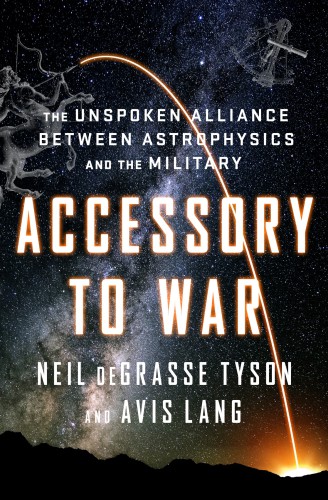
Accessory to War
The Unspoken Alliance Between Astrophysics and the Military
کتاب های مرتبط
- اطلاعات
- نقد و بررسی
- دیدگاه کاربران
نقد و بررسی

July 1, 2018
An exploration of the bonds, fiscal and intellectual, between science and the military.Every 3.6 days, write renowned astrophysicist Tyson (Astrophysics for People in a Hurry, 2017, etc.) and Lang, a research associate at the Hayden Planetarium, an unclassified research paper by a scientist affiliated with the Los Alamos National Laboratory appears, swelling the literature of astrophysics with work on supernovas, gamma ray bursts, and all such manner of future-shock science. The authors deliver a history that is broader than its subtitle suggests; though Tyson is a space scientist, the military-industrial complex leverages workers in every scientific discipline, from agronomy to zoology. This linkage has become ever tighter in the years since 9/11, when it was "a fine time to be a mercenary, a military engineering firm, or a giant aerospace company." Science and technology workers were close behind, flush with billions of dollars delivered to a wide variety of projects. Though academic scientists were a minor part of the mix, writes Tyson, "it has long been clear to me that the space research my colleagues and I conduct plugs firmly and fundamentally into the nation's military might." Thus it ever was, perhaps. Between 1903 and 1916, write the authors, only 1,000 planes were manufactured in the United States, but put on a war footing and with federal funds flowing, the aerospace industry was turning out twice that many planes every month, the product of the close relationship among industry, science, and government that has reigned ever since. The leveraging of science in the national interest goes against the basic spirit of the enterprise, since science is supposed to be universal and "in space there is no religion, culture, or politics"--and yet the military is where the money is even if the funding for astrophysics, and indeed basic science, is the tiniest fraction of military spending overall.An intriguing history. Look for mines and ray guns on the final frontier, for, as the authors conclude, "what a country funds is what that country prioritizes."
COPYRIGHT(2018) Kirkus Reviews, ALL RIGHTS RESERVED.

August 6, 2018
In this comprehensive history of astrophysics–military collaboration, astrophysicist Tyson (Astrophysics for People in a Hurry) and researcher Lang explore how two causes use similar tools for different ends. Over the centuries, the authors write, scientists and warmakers “have more often been in sync than at odds.” Sometimes they’re sides of the same coin, as, for instance, “astrophotography and photoreconnaissance differ only in their choice of target.” From the first telescopes to present-day satellites, the coevolution of science and war has frequently resulted in valuable inventions, like GPS, “whose value to the U.S. economy will soon be upwards of $100 billion” annually. Tyson’s own experience of attending an astrophysics conference in 2003, and realizing how many of the companies present had also contributed to the Iraq invasion, further illustrates the book’s point. While acknowledging how science has enabled war, as with the development of the atomic bomb, the authors argue astrophysics can also be a way to peace. Ventures such as mining asteroids for scarce resources, which could “erase a perennial rationale for war,” are one possibility. But they caution that “weaponization arrives close on the heels of militarization” in space. Well paced and skillfully written, the narrative seamlessly integrates science lessons, military strategy, and world history—surely suiting military and science buffs alike.

August 1, 2018
In a departure from his more spectacle-driven science books, popular astrophysicist Tyson takes a sobering look here at his profession's long-standing ties with the military. Joined by coauthor and Hayden Planetarium associate Lang, Tyson observes that as far back as WWI, when the input of airplane engineers figured heavily in sky combat outcomes, the armed forces have funneled government money into every variety and flavor of scientific research that might help build weapons of war. Tracing the military's influence on fact-finding as far back as the Greeks and the Egyptians, when stargazers helped guide warships into battle, the authors demonstrate how the invention of devices such as chronometers, astrolabes, and telescopes were motivated as much by a given country's drive to dominate another as by the search for knowledge. Although Tyson devotees might find this information-packed tome a little heavy-handed, it offers a timely message about the corrupting influence of mercenary interests on science and suggests that research dollars could be better spent on helping instead of hurting.(Reprinted with permission of Booklist, copyright 2018, American Library Association.)

September 1, 2018
Popular astrophysicist Tyson (Astrophysics for People in a Hurry) teams up with his long-time editor Lang on this work about the close-knit relationship between the scientific community and the military. Considered an "uneasy alliance" by the authors, it has proven mutually beneficial to both sides since ancient times. Throughout history, battles and wars have been won overwhelmingly by the side possessing the scientific advantage, which has resulted in increased government funding to both fields. This has caused significant damage through horrific weapons, environmental destruction, and death; yet, it has helped advance technological innovations, including telescopes, photography, radio, and mobile phones. Tyson and Lang consider whether we can heal from the damage caused by our warlike past and use our scientific expertise for productive, peaceful means. They suggest cooperative space endeavors for the good of humankind (extracting fresh water from comets, for example) but acknowledge that we may not yet be ready for that level of cooperation. VERDICT This detailed, well-written, and timely work on an important topic is highly recommended. [See Prepub Alert, 3/12/18.]--Dave Pugl, Ela Area P.L., Lake Zurich, IL
Copyright 2018 Library Journal, LLC Used with permission.

























دیدگاه کاربران